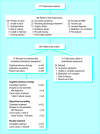Randomised controlled trial of intensive cognitive behaviour therapy for patients with chronic schizophrenia
- PMID: 9685273
- PMCID: PMC28621
- DOI: 10.1136/bmj.317.7154.303
Randomised controlled trial of intensive cognitive behaviour therapy for patients with chronic schizophrenia
Abstract
Objectives: To investigate whether intensive cognitive behaviour therapy results in significant improvement in positive psychotic symptoms in patients with chronic schizophrenia.
Design: Patients with chronic schizophrenia were randomly allocated, stratified according to severity of symptoms and sex, to intensive cognitive behaviour therapy and routine care, supportive counselling and routine care, and routine care alone.
Setting: Adjunct treatments were carried out in outpatient clinics or in the patient's home.
Subjects: 87 patients with persistent positive symptoms who complied with medication; 72 completed treatment.
Outcome measures: Assessments of positive psychotic symptoms before treatment and 3 months after treatment. Number of patients who showed a 50% or more improvement in symptoms. Exacerbation of symptoms and rates of readmission to hospital.
Results: Significant improvements were found in the severity (F=5.42, df =2,86; P=0.006) and number (F=4.99, df=2,86; P=0.009) of positive symptoms in those treated with cognitive behaviour therapy. The supportive counselling group showed a non-significant improvement. Significantly more patients treated with cognitive behaviour therapy showed an improvement of 50% or more in their symptoms (chi2=5.18, df=1; P=0.02). Logistic regression indicated that receipt of cognitive behaviour therapy results in almost eight times greater odds (odds ratio 7.88) of showing this improvement. The group receiving routine care alone also experienced more exacerbations and days spent in hospital.
Conclusions: Cognitive behaviour therapy is a potentially useful adjunct treatment in the management of patients with chronic schizophrenia.
Figures
Comment in
-
Intensive cognitive behaviour therapy for chronic schizophrenia. Specific effect of cognitive behaviour therapy for schizophrenia is not proved.BMJ. 1999 Jan 30;318(7179):331. doi: 10.1136/bmj.318.7179.331. BMJ. 1999. PMID: 9924074 Free PMC article. No abstract available.
-
Cognitive therapy is no better than supportive counselling in schizophrenia.BMJ. 1999 Sep 4;319(7210):643. doi: 10.1136/bmj.319.7210.643a. BMJ. 1999. PMID: 10473493 Free PMC article. No abstract available.
References
-
- Curson D, Barnes T, Bamber R, Platt S, Hirsch S, Duffy J. Long-term depot maintenance of chronic schizophrenic outpatients. Br J Psychiatry. 1985;146:464–480. - PubMed
-
- Falloon I. Cognitive and behavioural interventions in the self-control of schizophrenia. In: Strauss J, Boker W, Brenner H, editors. Psychosocial treatment of schizophrenia. Bern: Hans Huber; 1986. pp. 180–190.
-
- Tarrier N. Psychological treatment of positive schizophrenic symptoms. In: Kavanagh D, editor. Schizophrenia: an overview and practical handbook. London: Chapman and Hall; 1992.
-
- Haddock G, Sellwood W, Tarrier N, Yusupoff L. Developments in cognitive behaviour therapy for persistent psychotic symptoms. Beh Change. 1994;11:200–214.
-
- Haddock G, Tarrier N, Spauldin, W, Yusupoff L, Kinney C, McCarthy E. Individual cognitive-behavior therapy in the treatment of hallucinations and delusions: a review. Clin Psychol Rev (in press). - PubMed
Publication types
MeSH terms
Grants and funding
LinkOut - more resources
Full Text Sources
Medical
Miscellaneous

